 Check out these great books from Manning Publications!
Check out these great books from Manning Publications!
Manning is offering a 40% discount through July 15
to all DATAVERSITY members!
Just enter 12dv40 in the Promotional Code box
when you check out at manning.com.
 Tell us about yourself!
Tell us about yourself!
Submit a tweetable (140 characters or less) definition of #BigData and we may tweet it!
Big Data
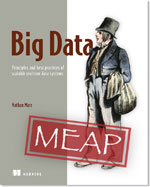 Services like social networks, web analytics, and intelligent e-commerce often need to manage data at a scale too big for a traditional database. Complexity increases with scale and demand, and handling big data is not as simple as just doubling down on your RDBMS or rolling out some trendy new technology. Fortunately, scalability and simplicity are not mutually exclusive—you just need to take a different approach. Big data systems use many machines working in parallel to store and process data, which introduces fundamental challenges unfamiliar to most developers...
Services like social networks, web analytics, and intelligent e-commerce often need to manage data at a scale too big for a traditional database. Complexity increases with scale and demand, and handling big data is not as simple as just doubling down on your RDBMS or rolling out some trendy new technology. Fortunately, scalability and simplicity are not mutually exclusive—you just need to take a different approach. Big data systems use many machines working in parallel to store and process data, which introduces fundamental challenges unfamiliar to most developers...
Click for more information and to buy>>
HBase in Action
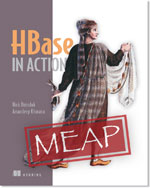 When you're dealing with big data, traditional databases don't cut it. Use the right tool for the job. HBase is a NoSQL storage system designed from the ground up for fast, random access to large volumes of data. Built on Hadoop, it runs on commodity hardware and scales along with you from modest datasets up to millions of columns and billions of rows...
When you're dealing with big data, traditional databases don't cut it. Use the right tool for the job. HBase is a NoSQL storage system designed from the ground up for fast, random access to large volumes of data. Built on Hadoop, it runs on commodity hardware and scales along with you from modest datasets up to millions of columns and billions of rows...
Click for more information and to buy>>
Neo4J in Action
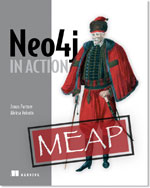 Databases are easier to develop and use when the structure of your data matches the way you think and talk about them. Neo4j is a new graph database that allows you to persist data more naturally from domains such as social networking and recommendation engines, where representing data as a graph of interconnected nodes is a natural choice. Neo4j significantly outperforms relational databases when querying graph data. It supports large data sets while preserving full transactional database attributes...
Databases are easier to develop and use when the structure of your data matches the way you think and talk about them. Neo4j is a new graph database that allows you to persist data more naturally from domains such as social networking and recommendation engines, where representing data as a graph of interconnected nodes is a natural choice. Neo4j significantly outperforms relational databases when querying graph data. It supports large data sets while preserving full transactional database attributes...
Click for more information and to buy>>
Taming Text
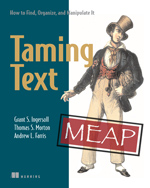 It is no secret that the world is drowning in text and data. This causes real problems for everyday users who need to make sense of all the information available, and software engineers who want to make their text-based applications more useful and user-friendly. Whether you're building a search engine for a corporate website, automatically organizing email, or extracting important nuggets of information from the news, dealing with unstructured text can be a daunting task...
It is no secret that the world is drowning in text and data. This causes real problems for everyday users who need to make sense of all the information available, and software engineers who want to make their text-based applications more useful and user-friendly. Whether you're building a search engine for a corporate website, automatically organizing email, or extracting important nuggets of information from the news, dealing with unstructured text can be a daunting task...
Click for more information and to buy>>
MongoDB in Action
 MongoDB in Action is a comprehensive guide to MongoDB for application developers. The book begins by explaining what makes MongoDB unique and describing its ideal use cases. A series of tutorials designed for MongoDB mastery then leads into detailed examples for leveraging MongoDB in e-commerce, social networking, analytics, and other common applications...
MongoDB in Action is a comprehensive guide to MongoDB for application developers. The book begins by explaining what makes MongoDB unique and describing its ideal use cases. A series of tutorials designed for MongoDB mastery then leads into detailed examples for leveraging MongoDB in e-commerce, social networking, analytics, and other common applications...
Click for more information and to buy>>
Redis in Action
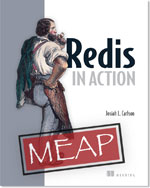 Redis is an innovative data tool that offers more flexibility than other available NoSQL key-value stores like Cassandra or DynamoDB. Because Redis accepts hashes, strings, lists, and other structures as values, you can expand the key-value idea to a wider range of use cases. Redis works with in-memory datasets to provide lightning-fast response times, and makes it easy to persist data to disk on the fly. It's free, open source, and easy to utilize from most standard programming languages...
Redis is an innovative data tool that offers more flexibility than other available NoSQL key-value stores like Cassandra or DynamoDB. Because Redis accepts hashes, strings, lists, and other structures as values, you can expand the key-value idea to a wider range of use cases. Redis works with in-memory datasets to provide lightning-fast response times, and makes it easy to persist data to disk on the fly. It's free, open source, and easy to utilize from most standard programming languages...
Click for more information and to buy>>
Lucene in Action, Second Edition
 When Lucene first appeared, this superfast search engine was nothing short of amazing. Today, Lucene still delivers. Its high-performance, easy-to-use API, features like numeric fields, payloads, near-real-time search, and huge increases in indexing and searching speed make it the leading search tool...
When Lucene first appeared, this superfast search engine was nothing short of amazing. Today, Lucene still delivers. Its high-performance, easy-to-use API, features like numeric fields, payloads, near-real-time search, and huge increases in indexing and searching speed make it the leading search tool...
Click for more information and to buy>>
Hadoop in Practice
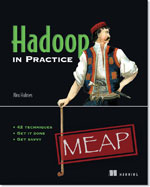 Hadoop is a open-source platform designed to efficiently query and analyze data distributed across large clusters. It's built around MapReduce, Google's algorithm for rapidly creating a distributed index of the Internet.
Hadoop is a open-source platform designed to efficiently query and analyze data distributed across large clusters. It's built around MapReduce, Google's algorithm for rapidly creating a distributed index of the Internet.
Click here for more information and to buy>>
Hadoop in Action
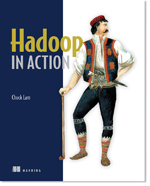 Big data can be difficult to handle using traditional databases. Apache Hadoop is a NoSQL applications framework that runs on distributed clusters. This lets it scale to huge datasets. If you need analytic information from your data, Hadoop's the way to go.
Big data can be difficult to handle using traditional databases. Apache Hadoop is a NoSQL applications framework that runs on distributed clusters. This lets it scale to huge datasets. If you need analytic information from your data, Hadoop's the way to go.

